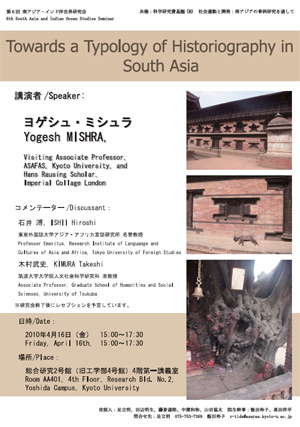第6回研究会
"Towards a Typology of Historiography in South Asia"

Yogesh Mishra,
Visiting Associate Professor, Graduate School of Asian and African Area Studies, Kyoto University, and Hans Rausing Scholar, Imperial College London
Hiroshi Ishii,
Professor Emeritus, Research Institute for Languages and Cultures of Asia and Africa, Tokyo University of Foreign Studies
Associate Professor, Graduate School of Humanities and Social Sciences, University of Tsukuba
Tatsuro Fujikura,
Associate Professor, Graduate School of Asian and African Area Studies, Kyoto University
Friday, 16th April, 2010 15:00-17:30
Room AA401, 4th Floor, Research Building No.2, Yoshida Campus, Kyoto University
http://www.asafas.kyoto-u.ac.jp/en/about/access.html
Towards a Typology of Historiography in South Asia
With all shades and tinges, the dominant form of history writing practice in South Asia today is a descendant of the Rankeian-Hegelian-Marxian sort brought in the early years of colonialism in that region. As historian Ranajit Guha shows in History at the Limit of World-History (2002), this sort of historiography supplanted an extant older tradition of history writing for which the Sanskrit epic Mahabharata was a locus classicus and from which Ram Ram Basu drew his notion of history for writing the first 'modern' historical work in South Asia, R?j? Prat?p?ditya-Charit (1802). Guha's delineation of several irreconcilable differences between these two traditions is helpful in arguing for historiographical pluralism in South Asia. In the wake of de-colonial and postcolonial scholarships, it is now fairly common to explicate this plurality in terms of irreconcilable yet interacting dichotomies such as European vs. Indian/Chinese/Islamic/Non-European or Western vs. Non-Western historiographies. These labels are not only inherently ambiguous; they also ignore heterogeneity - both contemporary and historical - that mark any tradition including European Historiography, as has been convincingly shown by Anthony Grafton in What was History (2007). Instead, I propose in this presentation a typology of history writing practices chiefly on the basis of the function historical texts attribute to the past events they recount. I will argue that the typology of 'argumental', 'geneologic' and 'episodic' histories is more productive description of the practices. It is also more comprehensive than Hayden White's typology of tropes as stated in his Metahistory (1973) and The Content of the Form (1987). For instance, while both argumental and geneologic histories share 'emplotment' and (somewhat loosely) 'chronology' - White's two narratological prerequisites for a text to be a history - episodic histories generally lack these features. As a result, historians working in the region relegate these histories to being mere sources of history instead of treating them as examples of history proper. Analysing an episodic history that was written and maintained by a Buddhist monastery in the nineteenth century Nepal Valley, I will attempt to salvage key features of this type of historiographical vision once vogue in that area and will illustrate the ways they peculiarly approach the past.